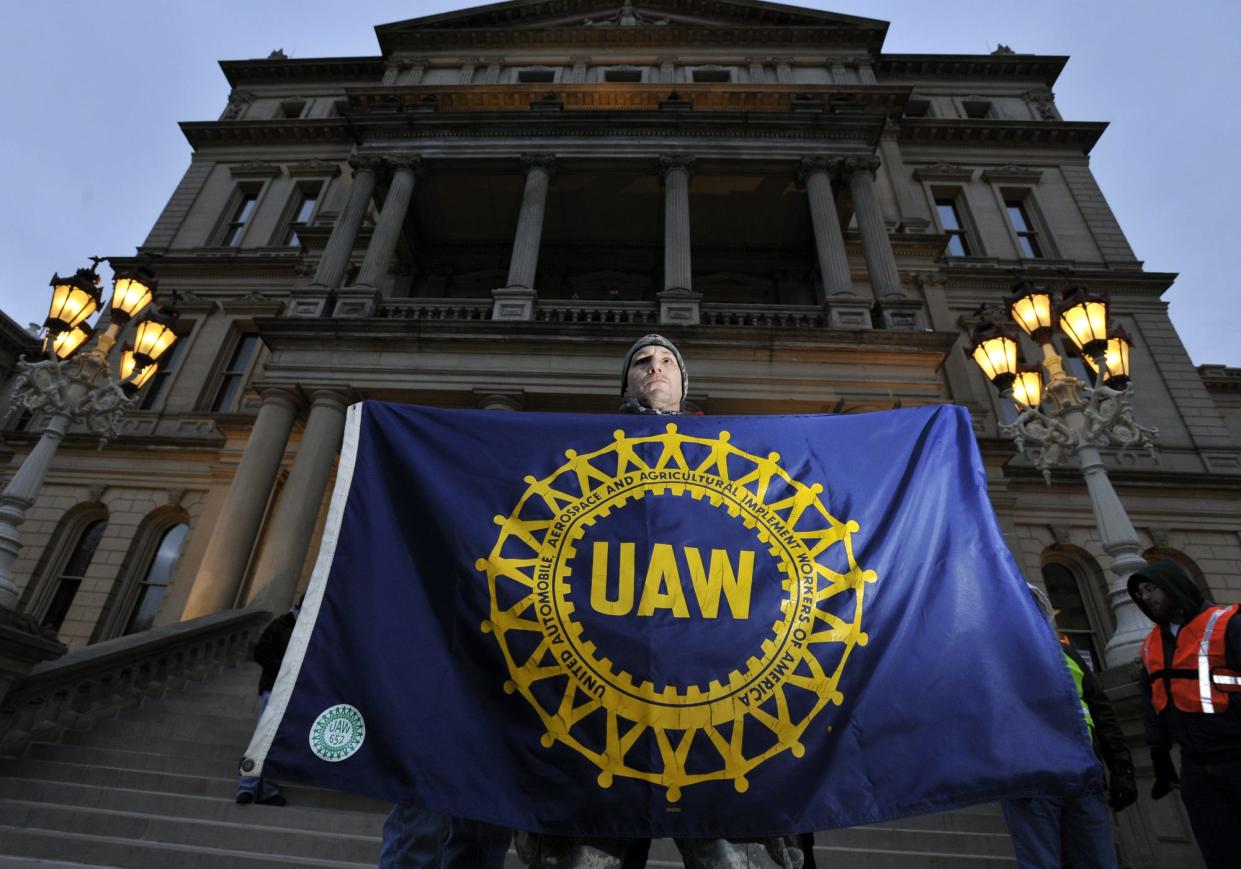Lansing UAW president urges workers to be frugal with spending as negotiations loom

LANSING — One of Lansing’s United Auto Workers local presidents is preparing for what could be an uncertain summer and fall amid increasingly contentious rhetoric ahead of negotiations for a new GM contract.
UAW Local 652 leadership, which represents General Motors’ workers at the Lansing Grand River Assembly, has begun discussing issues with employees as the union goes through its first set of contract negotiations since before the COVID-19 pandemic.
The UAW is beginning negotiations later this week with Ford and Stellantis, and on July 18 talks with General Motors are slated to begin. Local 652 President Ben Frantz said his workers, like those in many other UAW chapters, are preparing for the possibility of a strike, even as they hope to avoid that situation.
“All UAW Local 652 Units could be affected by a potential strike,” a notice on Local 652's website said in May. “Please take some time to complete this training and make sure that you and your family are financially ready to hold out against the company.”
Frantz said the advisory wasn’t based on specific predictions, grievances or inside information.
“Whenever you go into contract negotiations, there's a deadline — and that deadline is reached with a tentative agreement or the decision to use a work stoppage has to happen,” Frantz said. “It's something that is a last resort tool.”
"Plan for the worst, and hope for the best. We've been telling folks, 'If you don't need it, don't buy it,'" he added. "Just hold your money, let's see what September brings. Hopefully the two parties come together and create an agreement that's agreeable and you just have a whole bunch of money saved in the bank."
In a June video to members, new UAW President Shawn Fain said, "We’re in a very strong position to make major gains this round of negotiations, but only if our members get organized and are ready to strike."
As workers look ahead to negotiations, Frantz said the main issue among workers is product security.
“We want product commitment for many, many, many generations to come,” he said. “We've been building cars and for over 100 years in Lansing — we don't expect that to stop.”
Frantz said he expects some level of job loss with the end of Camaro production, which comes with the 2024 model. Still, he said, the Lansing area’s years of expertise, combined with future investments in a $2.6 billion Delta Township GM/Ultium Cells battery plant will put them in a good position.
“I believe, again, that the workmanship and the dedication to General Motors that the Lansing community in the workforce is shown will provide us with new products,” he said.
But Frantz acknowledged that future production opportunities would be a significant bargaining chip in the upcoming negotiations.
The union’s previous contract was negotiated in September 2019, shortly before the COVID-19 pandemic changed the workplace experience for union members.
“The entire work landscape is different,” he said. “So there will be a lot to discuss during this round of negotiations.”
In 2019, a six-week strike by UAW members led to alternating 3% wage increases and 4% lump sump payments, retention of health care coverage, signing bonuses for new employees and expanded employee profit sharing.
This year, Local 652, which represents about 2,100 employees — 1,500 at the Lansing Grand River GM plant — and 7,500 retirees expects to prioritize long-term benefits, such as retirement benefits and retiree health care. General wage increases have also been a priority nationally.
“If you're going to train folks to the level with which we have to be trained, then you need to pay them for that. And the last four years has raised the waterline on manufacturing pay,” Frantz said.
Fain has also prioritized ensuring steady pay and employment as the industry continues to shift toward electric vehicles, which are generally less complex to assemble and may require less workers. Fain expressed outrage with the Biden administration last month for awarding a $9.2 billion loan to Ford without guarantees for wages and working conditions.
Negotiations between the UAW and the Big Three auto makers have received increased national attention as Fain has made it clear that the union is willing and ready for tough negotiations. Fain, the first UAW president elected by a direct member vote, has done away with ceremonial handshakes between bargainers other niceties that have historically come with the negotiations.
And while Frantz took a more measured tone when discussing the coming weeks and months, he made it clear he would be prioritizing his workers in the negotiations.
“The working class has taken a backseat to corporate profits for plenty long enough. There's not a single person that manages a hedge fund that produces any type of product that’s durable,” he said. “The hands that build and create products are the ones who should be rewarded, and we're not asking anything to be given to us — we have earned it.”
Mike Huerta, president of UAW Local 602 that represents workers at General Motors' Delta Assembly plant, declined to comment, but said he would have more to say once negotiations begin. Local 602 has about 2,200 members at the Delta Township Assembly plant and more than 4,000 retirees, Huerta said.
Contact Sheldon Krause at skrause@lsj.com. Follow him on Twitter @sheldonjkrause.
This article originally appeared on Lansing State Journal: Lansing UAW president urges workers to be frugal as negotiations loom

